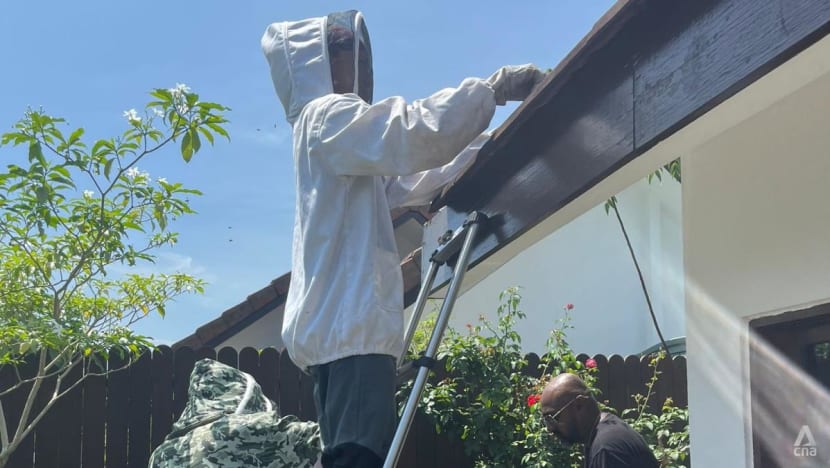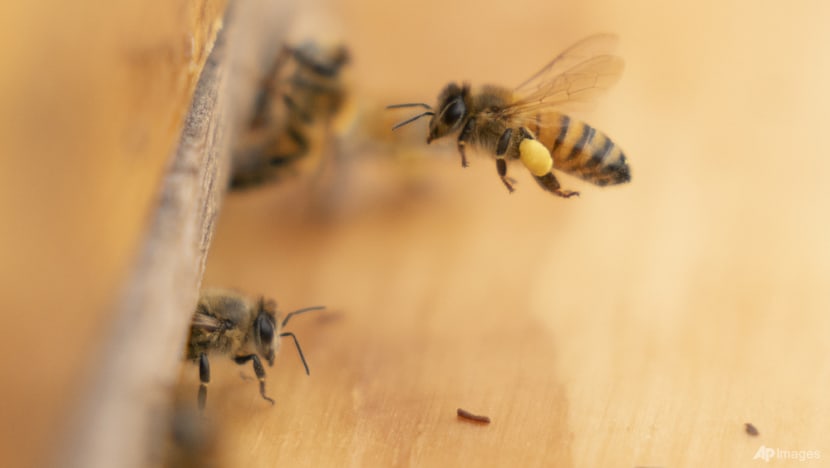Beekeepers in Singapore encourage relocating instead of exterminating bees
A course that will include bee relocation will be rolled out by November at the Singapore University of Social Sciences.

Mr Clarence Chua removing a bee hive from a client's home. (Photo: CNA/Clara Lee)
SINGAPORE: Former science teacher John Chong never thought he would become a beekeeper even in his wildest dreams.
When an opportunity to take his students to a bee farm in Malaysia came up about 10 years ago, he was against it. He was the chief safety officer for the trip and had thought it would be too dangerous.
That was until the bee farm owner assured him that the bees were stingless. They made the trip, and after that, he could not stop thinking about the bees.
His interest in the insects led him to Australia, where he helped beekeepers relocate bees and eventually took up beekeeping after about 40 years of teaching.
The founder of Bee Amazed Gardens, who holds classes over the weekend on beekeeping, wants to spread his knowledge further.
The 64-year-old is in the midst of collaborating with the Singapore University of Social Sciences to come up with a Continuing Education and Training (CET) course on beekeeping.
The course will be rolled out by November and it will include learning about how to relocate bee hives.
His hope is that those who learn about bees can pursue a business through the knowledge gained, he said.
“Relocation doesn't pay that well yet. But I hope to raise the status of this. This is a very dedicated service,” he said.
SKILLS NEEDED FOR RELOCATION
Many people contact exterminators with their beehive problems but these companies tend to outsource the business as the skills required are completely different from extermination.
"Most homeowners, when they have bee nests in their houses, they just want it gone. They’re not so concerned about whether it's saved, or it is killed. Their concern I will say a lot of the time is price, they just want to pay a market rate of about S$100 (US$74) to have it gone,” said beekeeper Clarence Chua.
Beehive relocation, on the other hand, comes at a higher price tag of up to S$450 because of the risk and equipment involved.
Mr Chong, who also provides bee relocation services, said that the process is “not that simple”.
“If it’s (the hive) easily accessible, it’s easier, the task can be completed within a short period of time. But some of them are more difficult (to handle) so they take a lot of time and effort because it takes a lot of time. And then most people are not willing to pay the amount,” said Mr Chong.
RELOCATION AS FIRST OPTION
Mr Chua, who is also founder of The Sundowner, a nature-based experience centre, said he has been twice as busy in the past few months, an uptick he takes as a good sign.
It means more customers are now thinking twice about killing off hives, he said.

Those in the industry said that getting more people skilled in this area could help address the current shortage of trained workers.
Like Mr Chong, Mr Chua uses his own apiary to teach people about bees.
One of the most popular segments at Mr Chua’s centre is hand-feeding honeybees with pollen in their hands. The activity goes a long way in addressing the stigma that bees are dangerous.
But he said that for bee conservation efforts to go further, authorities need to get on board.
Rather than extermination as the first course of action, he hopes they could try tapping relocation options instead.
"It will be a great success if the largest land owners such as SLA (Singapore Land Authority), NParks, town councils can at least consider this option,” said Mr Chua.
He added that protecting local honeybees will strengthen the ecosystem that depends on them.

















